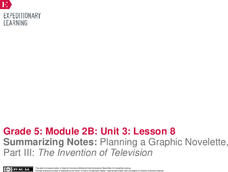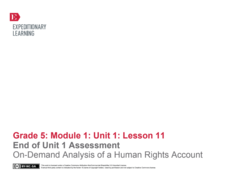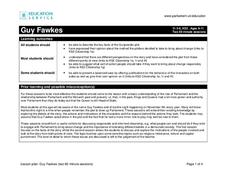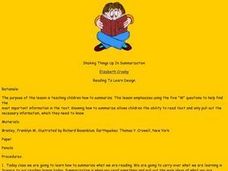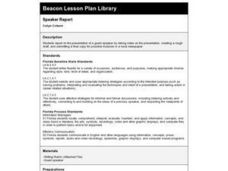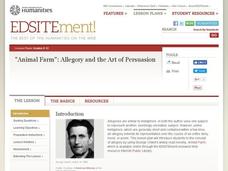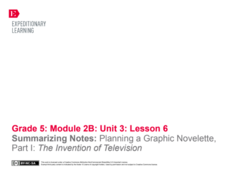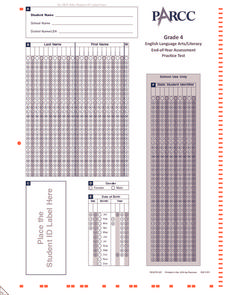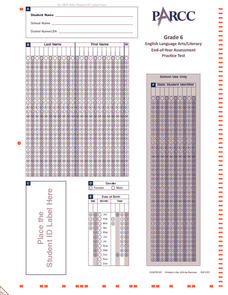EngageNY
Summarizing Notes: Planning a Graphic Novelette, Part III: The Invention of Television
How did the television change people's lives? Learners consider the question as they complete their storyboards about the invention of the TV, adding visual elements along the way. Then, they participate in a peer review to offer and...
Curated OER
Summarization Made Easy
Pupils explore the concept of summarization. They discuss the importance of summarization and the steps to summarize a text. Students read a text and highlight the important or main ideas within the text. They discuss the information...
Polk Bros Foundation
Show, Then Write What You Learn
After reading a text or covering a new topic, have class members fill out the four boxes on this page with facts. Individuals can use words or drawings to represent the facts.
Anchorage School District
Hints for Writing a Conclusion
Writing the conclusion of an essay can often seem like a superfluous or daunting task. Support your young writers in understanding the various types and purposes of a conclusion paragraph, such as summarizing key points of a paper or...
EngageNY
End of Unit Assessment, Part 2: Research and Response
Talk it out. Scholars complete part two of the assessment by participating in a World Café discussion activity. Learners circulate the room, sharing their ideas and thoughts about Canada's natural resources using quotes and paraphrasing...
Novelinks
Wildwood Dancing: Questions using Bloom’s Taxonomy of Thinking Process
Readers respond to a series of questions focused onJuliet Marillier's young adult novel Wildwood Dancing, and crafted to reflect the levels in Bloom's Taxonomy.
EngageNY
End of Unit 1 Assessment: On-Demand Analysis of a Human Rights Account
The last instructional activity in this unit about human rights consists of a final assessment. To demonstrate the skills your class has acquired throughout this unit, they will work with a new article entitled "From Kosovo to the United...
Curated OER
Mini-Lesson Planning for Inferences
Making inferences and drawing conclusions is a key component to successful active reading. Encourage your class to use context clues and prior knowledge to infer different elements of a story, including the setting, plot, and character...
Curated OER
Balancing Equations and Using a Pyramid
Sixth graders complete worksheets and make journal entries to interpret mathematical expressions about the pyramids. In this equality by balancing equations lesson plan, 6th graders participate in groups or by themselves to complete...
Curated OER
Mapping Out Summarization
Students summarize a selected piece of text using a a six step process. After reviewing the correct way to read silently, students read a selected piece of nonfiction text. They write a summary paragraph using the six step process...
Curated OER
Guy Fawkes
Sixth graders access their prior knowledge of the job of Parliament and its relationship to the monarchy. In this Gunpowder Plot lesson, 6th graders research the Gunpowder Plot, summarize key story ideas, and role play the plot. They...
Curated OER
Shaking Things Up In Summarization
Students practice several techniques and strategies to become better at summarizing a piece of writing. They emphasize the five "W's: who, what, where, when and why. A book of Earthquakes is read and then summarized by each of the students.
Curated OER
The Bear Facts About Summarization
Students practice summarizing techniques in this lesson. They listen as the teacher reads from a non-fiction article, and the class creates a story map to highlight the most important facts from the article. They use the map to write a...
Curated OER
Listening To a Guest Speaker
Pupils review the main points of note-taking to summarize the content of a formal or informal spoken presentation. They hear a guest speaker talk about a pre-arranged topic and take notes during the presentation. Next, they write a...
Curated OER
Speaker Report
Fifth through eighth graders think of themselves as newspaper reporters as they listen to a presentation by a guest speaker. As reporters, they take notes during the presentation. Using these notes, they create a rough draft and then a...
National Endowment for the Humanities
Animal Farm: Allegory and the Art of Persuasion
Introduce your class members to allegory and propaganda with a series of activities designed to accompany a study of George Orwell's Animal Farm. Readers examine the text as an allegory, consider the parallels to collective farms...
EngageNY
Summarizing Notes: Planning a Graphic Novelette Part 1: The Invention of Television
What's the story? Learners create the first of four storyboards about the invention of the television, incorporating narrative techniques and descriptive details. Next, they offer and receive feedback by participating in a peer critique...
State Bar of Texas
Brown v. Board of Education
You walk each day over 20 blocks to school as a 9-year old because the color of your skin does not allow you to attend a school in your own neighborhood. Scholars use the 1954 Supreme Court case Brown v. Board of Education to investigate...
Achievement Strategies
CCSS Unit Design Template for Art
Art classes, like any lab class, require extensive preplanning and set-up time. Use this planning template in the quiet before the storm to identify the equipment and materials that will be needed, the procedures and processes...
EngageNY
End of Unit Assessment, Part II: Storyboard Draft, Sections 2 and 3
It's time to demonstrate knowledge. With the instructive resource, pupils complete the second part of the end of unit assessment. They develop sections two and three of their storyboards about an invention, add visual elements, and then...
Curated OER
End-of-Year Practice Test (Grade 4 ELA/Literacy)
The time has come to find out what your fourth grade readers have learned after another year of hard work. This Common Core-designed practice assessment provides two reading passages, one narrative and one expository, that children must...
Curated OER
End-of-Year Practice Test (Grade 6 ELA/Literacy)
With the end of the year quickly approaching it's time to find out exactly how much your sixth graders have learned. Specifically designed for the Common Core ELA standards, this practice test gives students five reading passages,...
Florida Center for Reading Research
Comprehension: Expository Text Structure, Text Feature Find
Scholars explore an expository text to answer questions about its structure.
Media Education Lab
The Ethics of Propaganda
What are the short and long-term consequences for consumers and producers of modern media propaganda? Class members ponder this essential question as their unit study of ethics of propaganda concludes. After examining two case...
